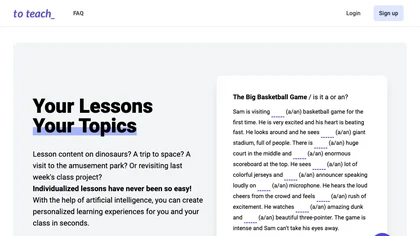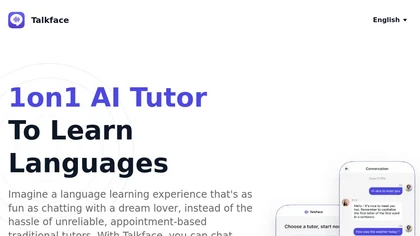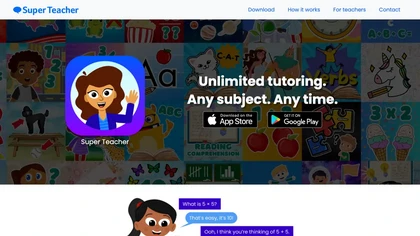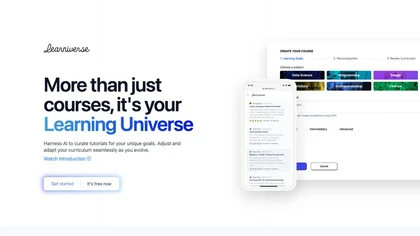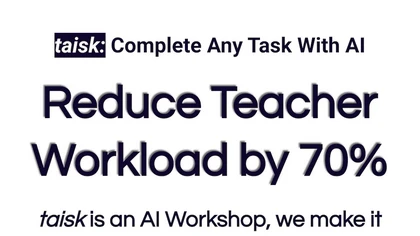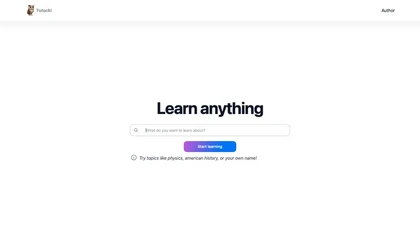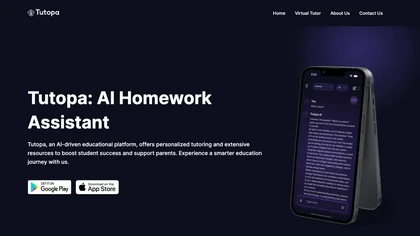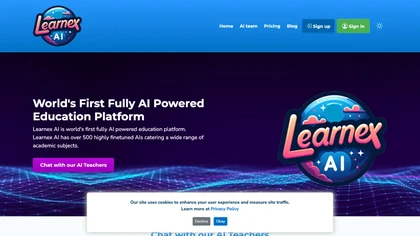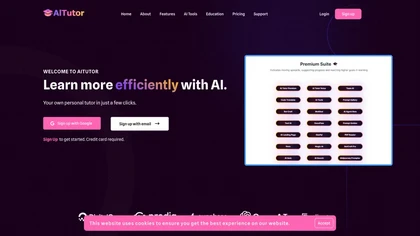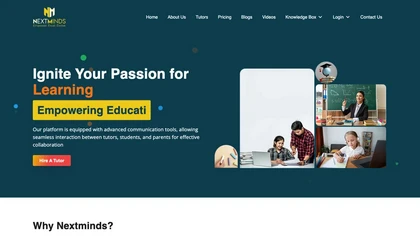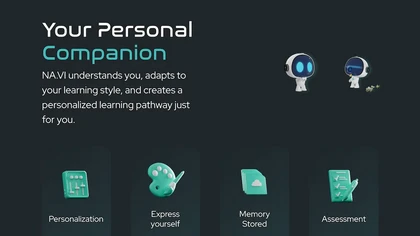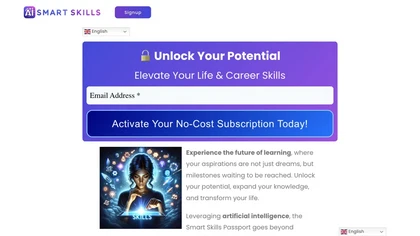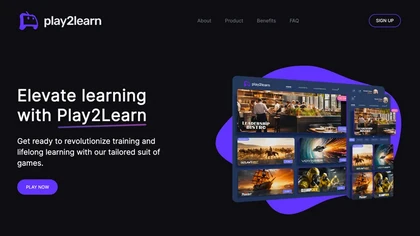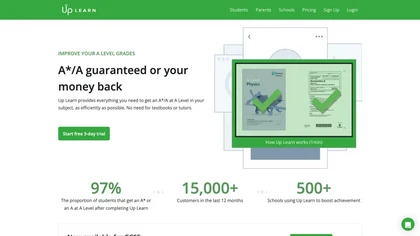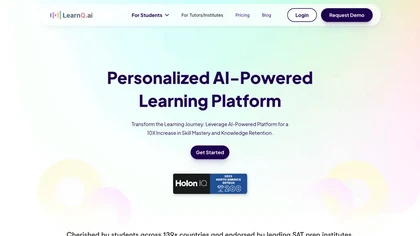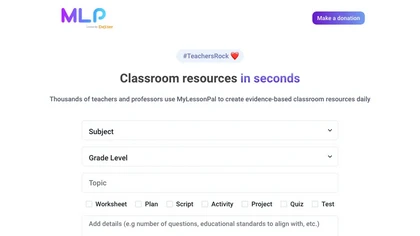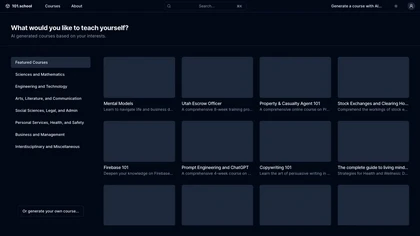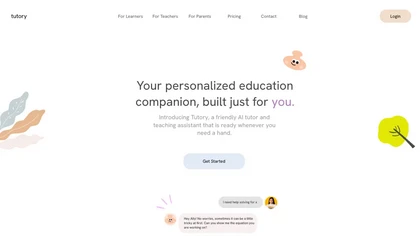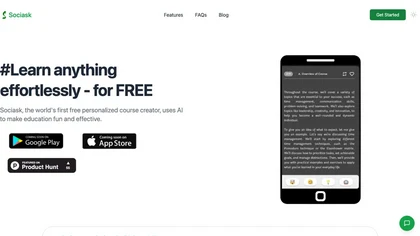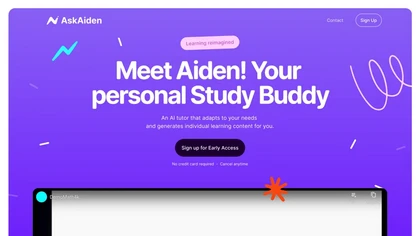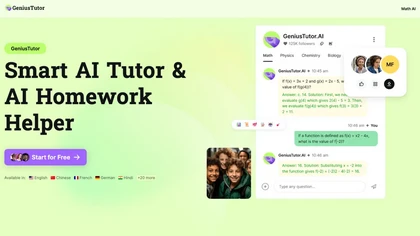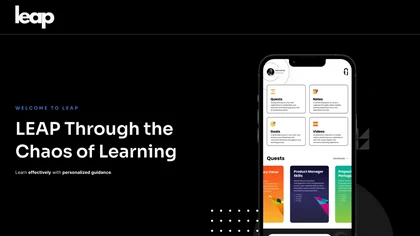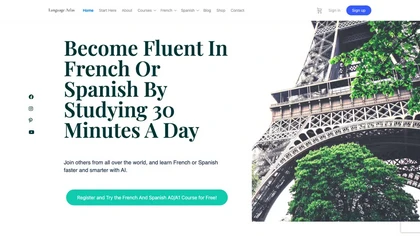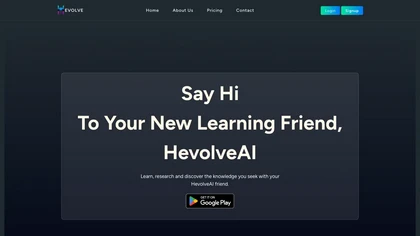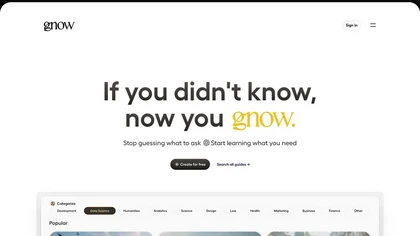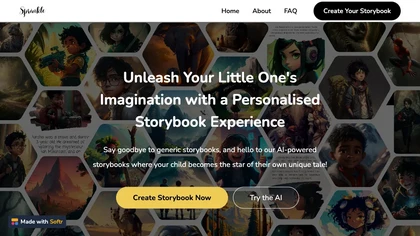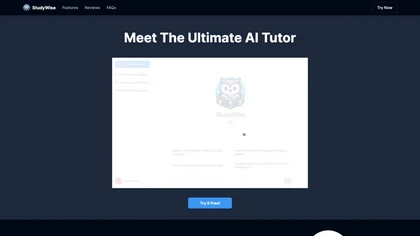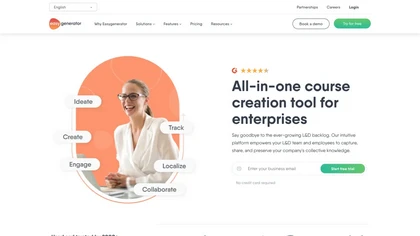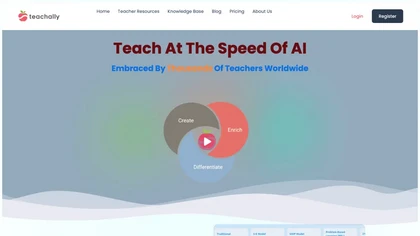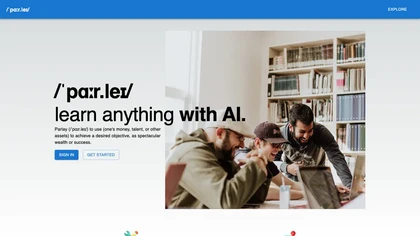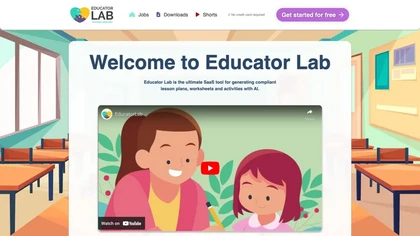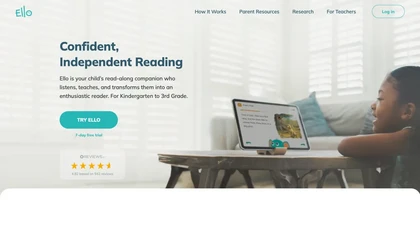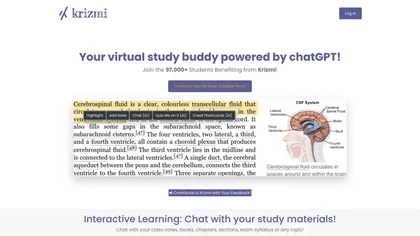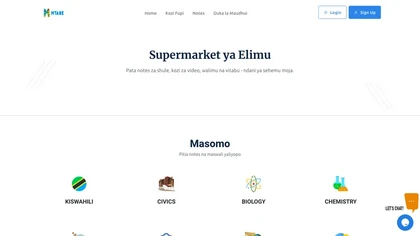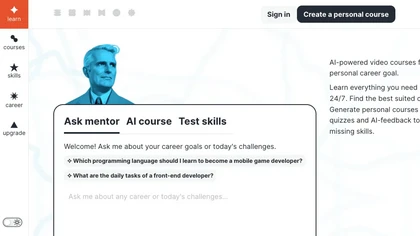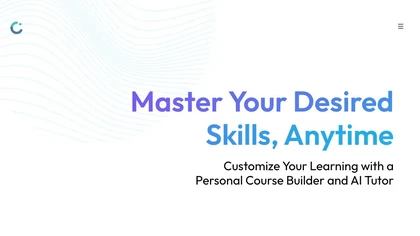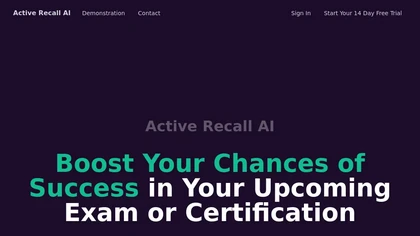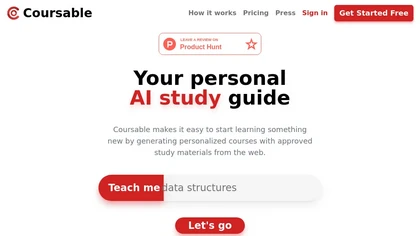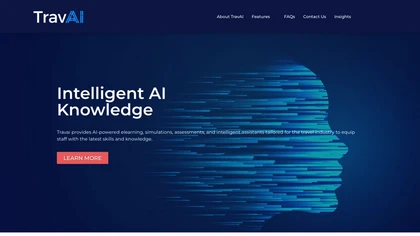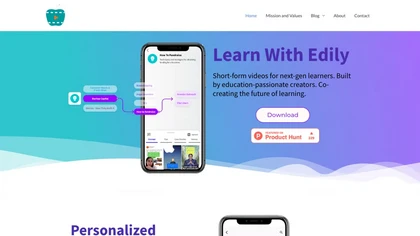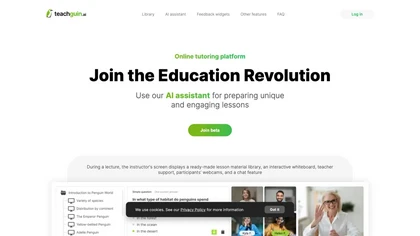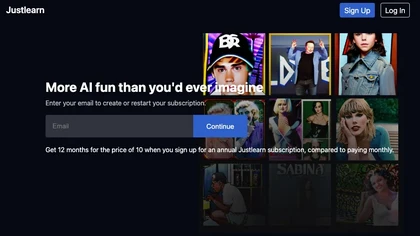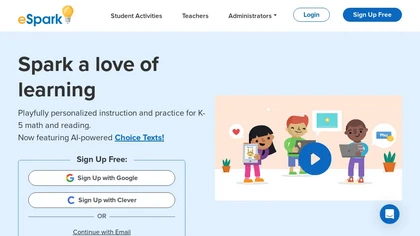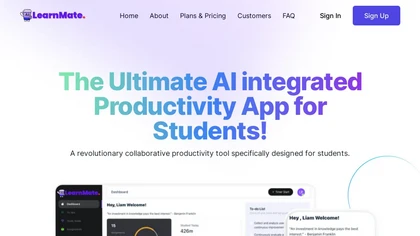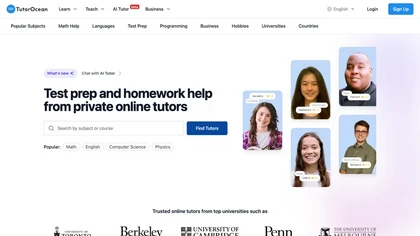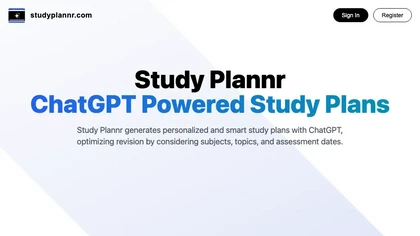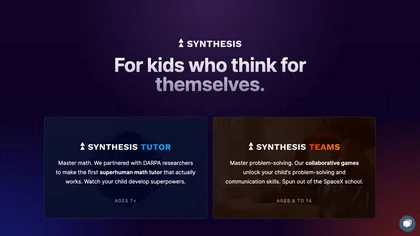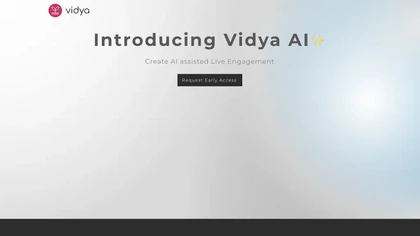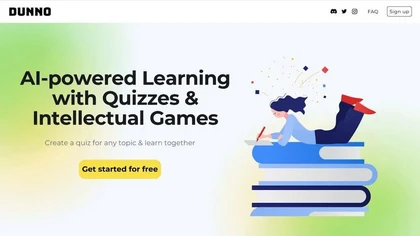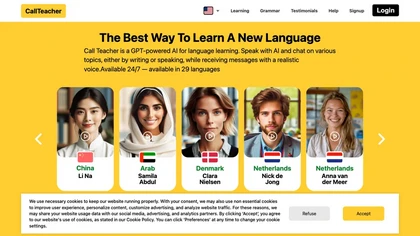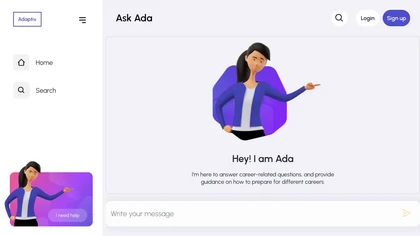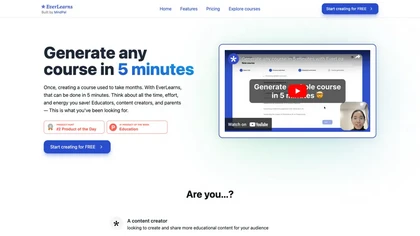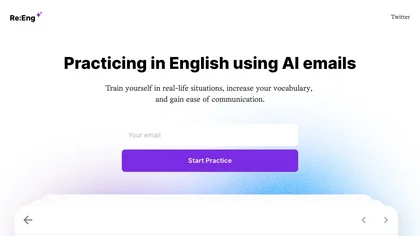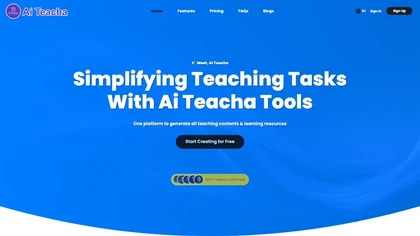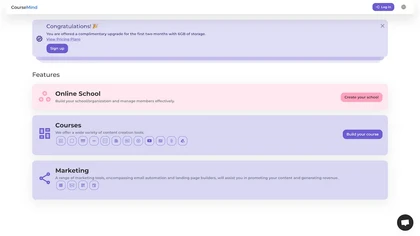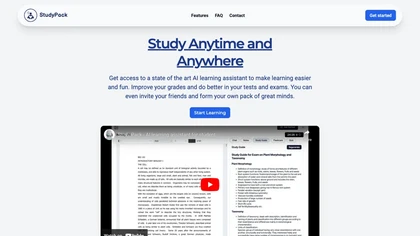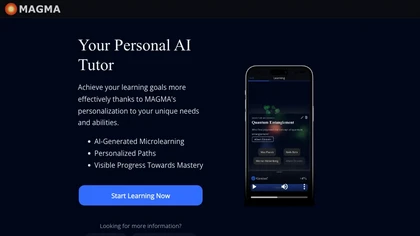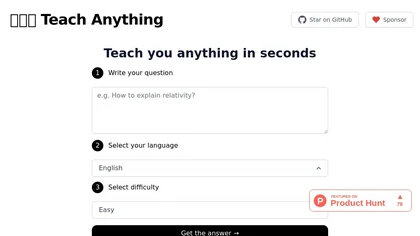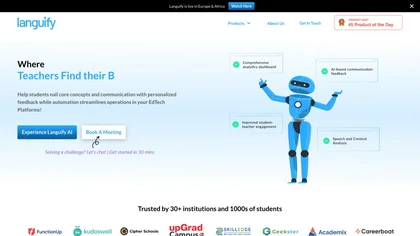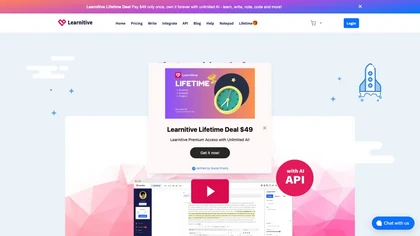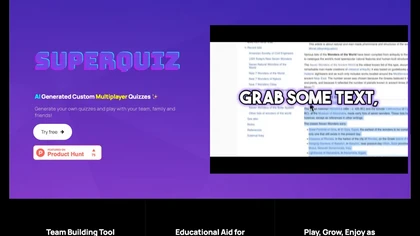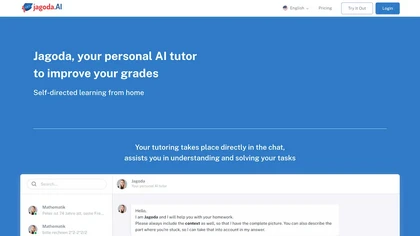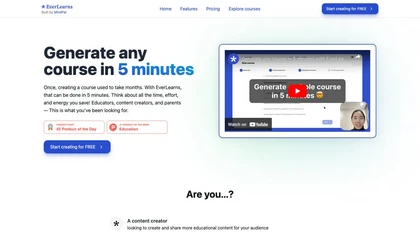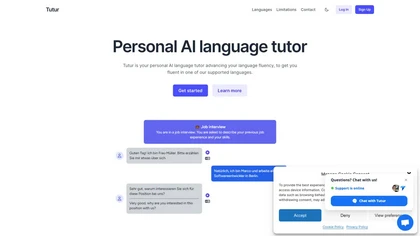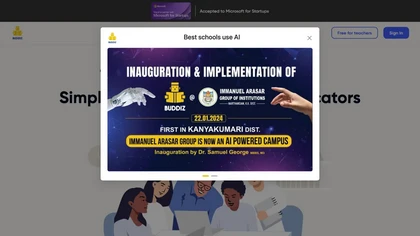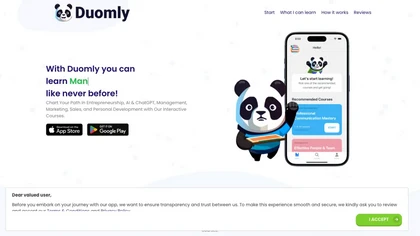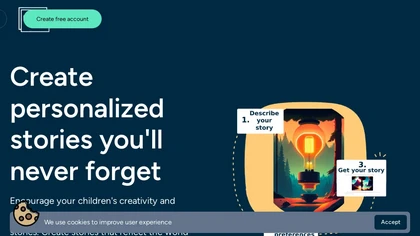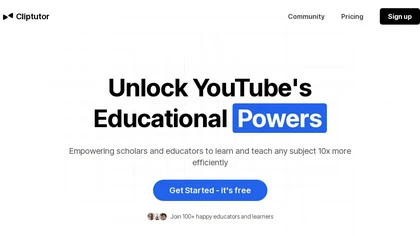AI use cases for Education
Generative AI can be applied in various applications for education. Here are some examples to explore below for inspiration with AI tools to get you started with using AI in education.
🛠️ 70 AI tools for Education
Explore a dynamic list of some of the most popular tools to get you started with various AI use cases and applications for Education to streamline your workflows and productivity today.
To Teach features
- Create personalized exercises
- Create lesson plans
- Tailor teaching materials to students' interests
- Offer free and paid plans
- Work alongside human teachers
Talkface features
- 1-on-1 tutoring
- Personalized curriculum
- Language learning
- Fun and engaging
- Affordable solutions
- Eliminates need for unreliable tutors
- Available on android and ios devices
Super Teacher features
- Unlimited tutoring for $10/month
- Connect with experienced teachers
- Conversational and interactive format
- Personalized learning experience
- Variety of subjects available
Learniverse features
- Curates tutorials based on unique learning goals
- Seamlessly adjusts and adapts curriculum as user progresses
- Mobile-friendly UI
- Personalized pathways tailored to ambitions
- Provides trustworthy collection of educational resources
Interactive Tutor features
- AI bot creation and customization
- Integration with popular platforms (Wonde, Teams, Google)
- Access to GPT-3.5, GPT-4.5 Turbo, Dall-E, and AI Bot Library
TutorAI features
- Learning
- Customization
- Tracking
- Interactive
- Quizzes
Tutopa features
- Personalized tutoring
- Extensive educational resources
- Instant feedback feature
- Coverage of all grades
- User-friendly app interface
🔥
Create your account, save tools & get personal recommendations
Receive a weekly digest of our handpicked top tools.
Unsubscribe anytime
Learnex AI features
- AI-powered education platform
- 500 highly fine-tuned AI teachers
- Chat support for various academic subjects
- Assistance in subjects like mathematics, history, sociology
- Diverse range of topics covered
AI Tutor features
- Personalized education
- AI models for teaching
- Assistance with assignments
- Support for multiple languages
- Voice-activated features
Nextminds features
- online tutoring platform
- connects students with expert tutors
- offers private one-on-one sessions and group classes
- user-friendly platform for easy scheduling
- promotes effective collaboration between tutors, students, and parents
NA.VI features
- Personalized learning pathways
- Adaptive to unique learning styles
- Interactive features
- Assessment tools exploration
- Data privacy prioritization
SmartLifeSkills
4.8SmartLifeSkills features
- Interactive platform with AI chatbots
- Multilingual lessons with authentic accents
- Adjustable playback speed
- Advanced text-to-speech technology
- Custom quiz generator
Play2Learn features
- Transforms training and lifelong learning through gamification
- Provides dynamic and immersive scenarios for users
- Offers interactive learning experience tailored to individual goals
- Utilizes AI tools for customization of scenarios and tests
- Allows tracking of progress, identifying knowledge gaps, and enjoying diverse gaming scenarios
Up Learn features
- AI-powered educational tool
- World-class learning content
- Interactive videos
- Detailed progress tracking
- AI-powered diagnostic algorithm
LearnQ.ai features
- Personalized AI-powered learning platform
- Real-time insights and data-driven guidance
- AI-powered assessments for addressing learning gaps
- AI-powered student analytics for tracking progress
- AI tutor (Mia) for personalized guidance
MyLessonPal features
- Generate worksheets
- Create lesson plans
- Develop scripts
- Design activities
- Craft quizzes
- Create tests
101.school features
- Course recommendation generation
- Innovative course search feature
- AI technology utilization
- Wide range of course topics
- Diverse subject coverage
Tutory features
- Personalized education companion
- Adaptive memory system
- Tailored learning experience
- Teaching assistant functionalities
- Support for educators, parents, and learners
Sociask features
- Personalized course creation
- Tailored learning experiences
- Adaptive learning approach
- Use of intuitive examples and analogies
- Utilization of AI for enhanced comprehension
Ask Aiden AI features
- Adapts to student's needs
- Generates custom learning content
- Provides personalized lessons and quizzes
- Offers real-time insights and analysis
- Includes tools like quizzes, notes functions, and simulations
SchoolXpress features
- Generative AI tool
- Transforms traditional learning materials into interactive content
- Supports over 50 languages for uploaded content
- Enables voice-activated commands for interactions
- Automatically generates references and citations
GeniusTutor ai features
- Comprehensive academic support
- Powered by cutting-edge GPT language models
- Tailored solutions across STEM and humanities fields
- Contextual analysis capabilities
- Personalized learning assistance for students
Leap Learning features
- Personalized guidance
- Comprehensive collection of video-based text-based formats
- Flexible content types for different learning preferences
- Subscription service with beta testing phase
- Focus on utility in various subjects like business strategy, management, finance, data science
Language Atlas features
- adaptive lessons
- flashcard usage
- speaking practice
- audio and video examples
- global community
Hevolve AI features
- Personalized and immersive learning experiences through AI generative avatars
- Adapts to individual learning styles
- Provides interactive assessments
- Offers personalized content delivery
- Supports interactive book learning
gnow features
- Personalized learning tool
- Structured and comprehensive content
- Interactive tools (quizzes, flashcards)
- AI integration for abstract idea visualization
- Community-driven guides
Sprinkle features
- Story generation
- Personalization
- Unique tales
- Adventure
- Ai technology
StudyWise features
- Transforms study sessions into interactive dialogues
- Personalized study assistance based on learning style and pace
- Interactive quizzing for better knowledge retention
- Ability to import study materials from various sources
- Available 24/7 as an AI study partner
EasyAI features
- Consent management
- Cookie utilization
- Auto-translation into 75 languages
- Text-to-speech capabilities
- Importing PowerPoint presentations
Teachally features
- Personalized lesson plan creation
- Alignment with over 400,000 educational standards
- Enrichments tailored to each student's needs
- Instant translations in over 100 languages
- Dynamic assignment assessment and customization
Parlay features
- Customized learning paths creation
- Progress tracking features
- Limitless customization options for learning styles
- Learning convenience with anytime, anywhere access
- Free access option
EducatorLab features
- Generate compliant lesson plans
- Create PDF and DOC files
- Tailored to specific grades, academic subjects, and levels
- Access a vast library of educational resources
- Automate the assessment process
helloello.com features
- Adaptive learn™ technology
- Personalized reading experience
- Proprietary AI engine
- Exclusive decodable e-books
- Reading coach app
Stadai features
- Interactive chat functionality
- Auto-generation of flashcards
- Personalized study materials
- Customized quizzes
- Comprehensive progress tracking
Mtabe features
- Comprehensive e-learning platform
- Wide array of educational resources
- Access to school notes, video courses, teacher support, and textbooks
- Covering subjects like civics, biology, chemistry, Microsoft Excel, and English language studies
- Focus on technology education
Unschooler features
- Career guidance
- Personalized courses
- Video courses
- Quizzes
- Ai feedback
Chat2course features
- Customizable learning
- Personal course builder
- Ai tutor
- Ai-curated course selections
- Human collaboration features
Active Recall features
- Automatically generated quizzes
- Writing assignments from uploaded study material
- Multiple-choice questions based on text
- Essay questions based on practical medical scenarios
- Tailored question bank reflecting certification structure
Coursable.io features
- Generate personalized courses
- Adjust course based on subject needs
- Evaluate quality of online materials
- Provide optimal course for learning
- Customize courses
- Act as education booster
- Curate courses
- Adapt to individual preferences
- Learn at own pace
- Track progress
Whiteboard features
- Generates interactive summaries
- Allows users to ask questions
- Supports note-taking and bookmarking important ideas
- Provides features for creating and sharing flashcards
- Integrated work with other platforms such as canvas, zoom, and youtube
TravAI features
- AI-powered eLearning
- Simulations
- Assessments
- Intelligent assistants tailored for travel industry
- Utilizes artificial intelligence for training course creation
Edily features
- Short-form learning videos
- Tailored for Gen-Z students
- User-generated content from authentic influencers
- Promotes inclusivity and interactivity
- Personalized learning maps
Teachguin features
- Library of ready-made materials
- Interactive whiteboard
- Webcams for participants
- Chat feature
- Customizable lesson planning parameters
JustLearn features
- Connect students with language tutors and native speakers
- Provide language teachers worldwide
- Marketplace to help students learn any language faster
- Create and customize 3d digital characters for various purposes
eSpark features
- Personalized instruction
- Interactive math and reading activities
- Identifies learning gaps
- Small group lessons and activities
- Targeted intervention
Learnmate features
- Set study goals
- Manage assignments
- Collaborate with others
- Take amazing study notes
- Use ai tutor
tutorocean.com features
- Search for tutors specializing in various courses
- Request a tutor and let the team find a match
- Ask questions and get answers from experts
- Connects students with tutors blending human expertise and AI technology
- Access to top-quality online tutoring and interactive classrooms
StudyPlannr features
- Generate personalized study plans
- Consider subjects, topics, and assessment dates
- Self-regulate and improve revision efficiency
- Download as pdf or print for easy reference
- Support students in goal setting and cultivating good study habits
Synthesis features
- AI-powered math tutoring tool
- Enhances problem-solving skills in children aged 7 and above
- Collaborative games to foster communication and critical thinking abilities
- Cultivates students' strategic thinking and collaborative problem-solving capabilities
- Focuses on empowering young minds to tackle complex challenges
Vidya features
- Customized question generation
- Topic and difficulty level specification
- Question library creation and sharing
- Streamlined content creation process
- Data-driven insights for enhanced learning outcomes
DUNNO features
- Create interactive quizzes
- Deepen understanding
- Boost engagement
- Transform meetings and events
- Entertain and spice up gatherings
Callteacher features
- Real-time interaction for practicing speaking, listening, reading, and writing skills
- Personalized courses tailored to individual progress and interests
- Engage in one-on-one conversations with AI teachers
- Multilingual support for 29 languages
- 24/7 service availability and progress tracking
Adaptiv Academy features
- Personalized online courses
- Adaptive learning
- Searchable courses
- Progress tracking
- Referral programs
EverLearns Studio features
- Course generation
- Customizable topics, audience, and language preferences
- AI-powered smart editor for content creation
- Interactive elements like quizzes and flashcards
- Easy sharing and publishing options
Re:Eng features
- Email practice
- Vocabulary building
- Real-life situation practice
- Progress tracking
- Language barrier breaking
AI Teacha features
- Lesson note generator
- Activity generator
- Lesson plan generator
- Visual teaching aids
- Assessment generator
CourseMind features
- Course creation
- Content creation tools
- Marketing tools
- Email automation
- Landing page builders
Study Pack features
- Chat assistant for natural text-based conversations
- Create comprehensive study guides
- Master new topics with interactive flashcards
- Test knowledge with quizzes covering various subjects
- Simplify note-taking by generating concise summaries
MAGMA Tutor features
- Personalize learning experience
- Match unique needs and abilities
- Create personalized learning paths
- Track progress towards mastery
- Browser support
Teach Anything features
- Learn concepts
- Teach concepts
- Suggestions in language
- Difficulty level
Languify features
- Personalized feedback automation
- Streamlined operations
- Mock interviews
- Detailed feedback on speech understanding
- Viva voces assistance
Learnitive features
- AI writer for generating unique copyscaped content
- Note-taking app for organizing projects efficiently
- AI prompts for tuning output
- Search through millions of academic papers and Wikipedia for references
- AI-assisted interactive workspaces for auto-generating codes, illustrations, and contents
SuperQuiz features
- AI-generated custom quizzes
- Multiplayer quiz environment
- Customized quizzes tailored to specific industries, company culture, and educational subjects
- Real-time multiplayer functionality
- Secure privacy features
Jagoda features
- Personalized assistance
- Homework problem solutions
- Tailored feedback
- Adapts to learning style
- Follow-up questions
EverLearns 2.0 features
- AI-powered course generation
- Course customization based on preferences
- AI editor for writing and editing content
- Creation of interactive features like quizzes, flashcards, and mindmaps
- Conversion of course to PDF format for sharing and publishing
Tutur features
- Detailed insight into fluency progress
- Multiple practice scenarios
- User-friendly interface
- Speech analysis
- Progress tracking
Buddiz features
- Personalized learning paths
- Real-time insights
- Interactive challenges
- Automated grading
- Mental health support
Duomly features
- Interactive courses in entrepreneurship, AI, management, marketing, sales, and personal development
- Bite-sized lessons and engaging quizzes
- Hands-on experience and progress tracking
- Learning about AI, coding, and mastering new tech trends
- Interactive micro-lessons
Tinytales features
- Customized story creation
- Protagonist appearance customization
- Illustration style customization
- Narration customization
- Dialogue customization
Cliptutor features
- Personalized tutoring
- Ai-enabled youtube video chat
- Customizable quizzes
- Language support
- Media uploads
